宾 语 从 句 (The Object Clauses)
宾语从句(1)

He said
1) He_w_o_u_l_d__g_o_to Hong Kong . 2) He__w_a_s__sick. 3) He_w__a_s_r_e_a_d_in_g__a book. 4) He_h_a_d__fi_n_i_s_h_e_d_his work.
2.当主句是一般过去时的时候,宾语从句必须用相应 的过去的某一种时态,从而达到主句和从句的相互一 致。(主过从过)
Jim has been ( be ) to the Great Wall twice. Jim was playing ( play ) basketball when
his father came back. Jim had learned ( learn )1000 Chinese
words by the end of last term.
1.I don’t know what I shall do next .(变为简单句)
→ I don’t know what to do next . 2.John didn’t decide which book he would buy .(变为简 单句) → John didn’t decide which book to buy . 3.Can you tell me how to get to the bus stop ?(变为复合 句) → Can you tell me how I can get to the bus
宾语从句例句

宾语从句例句宾语从句(Examples of Object Clauses)宾语从句是指在一个句子中充当宾语的从句。
它通常由连接词引导,放在及物动词、介词后面,或者作为及物动词的宾语。
下面是一些宾语从句的例句:1. I believe that he is telling the truth.(我相信他在说实话。
)2. She asked me if I wanted to go shopping with her.(她问我是否愿意和她一起去购物。
)3. He doesn't know where she lives.(他不知道她住在哪里。
)4. They wonder when the concert will start.(他们想知道音乐会何时开始。
)5. We can't decide which movie to watch.(我们无法决定看哪部电影。
)注意,宾语从句引导词的选择取决于主句的动词。
下面是一些常见的引导词以及它们的用法:1. 连接词“that”用于陈述句,表示宾语从句中的内容是对主句的陈述。
例:They said that it was going to rain tomorrow.(他们说明天会下雨。
)2. 连接词“if/whether”用于疑问句,表示宾语从句中的内容是对主句的疑问。
例:I don't know if he will come to the party.(我不知道他是否会来参加派对。
)3. 连接词“wh-”引导疑问词,表示对某一具体内容的疑问。
例:She asked me what I was doing last night.(她问我昨晚在做什么。
)4. 连接词“whether or not”用于二者选择的情况,表示对某个问题的二选一。
例:You need to decide whether or not you will accept the job offer.(你需要决定是否接受这份工作邀请。
名词性从句

表语从句( the Predicative Clause ) The question is who can do the experiment. The reason for his lateness was that he got up late. China is no longer what she used to be.
连接词 ( Conjunctions )
that, whether/if(只用于宾语从句), as if (只用于表语从句) 连接代词( Conjunctive pronouns )
who, which, what, whose(宾语从句)
连接副词( Conjunctive adverbs )
when, where, how, why
B (4) These photographs will show you ______. A. what does our village look like B. what our village looks like C. how does our village look like D. how our village looks like A (5) _____ he said at the meeting astonished everybody present. A. What B. That C. The fact D. The matter D for the violin. (6) He asked _____ A. did I pay how much B. I paid how much C. how much did I pay D. how much I paid
பைடு நூலகம்
主语从句( the Subject Clause ) Whether we will visit the Great Wall tomorrow has not been decided. That he will come is certain. It is certain that he will come. How this happened is still a question. What he said at the meeting is important.
从句的用法

C) Introduced by relative pronouns and adverbs(连接代词和 连接副词) 一、构成: 1. 1.宾语从句可由连接代词what, who, whom, which等引导, 它们在宾语从句中可作主语、宾语、表语和定语等,因此不 能省略。 Do you know who will come this afternoon? (作主语) Did you hear what he said? (作宾语) I don’t know whose that is. (作表语) Could you tell me which gate we have to go to? (作gate的 定语) 2. 宾语从句可由连接副词when, where, how, why等引导, 它们在宾语从句中作状语,不可省略。 We didn’t know when she would come back. Could you tell me how I can get to the post office? No one knows why she is late again. Back
2. Could you tell me the way to the station? (改写句子,句意不 变) (青岛) can get to the station? Could you tell me how I 3. “I have finished my homework.” John told me. (改为复合句, 句意不变) (天津) had finished his homework. John told me that he 4. I don’t how I can reach the zoo. (改为简单句) (宿迁) to get to the zoo. I don’t know how
中考英语复习宾语从句讲解+练习
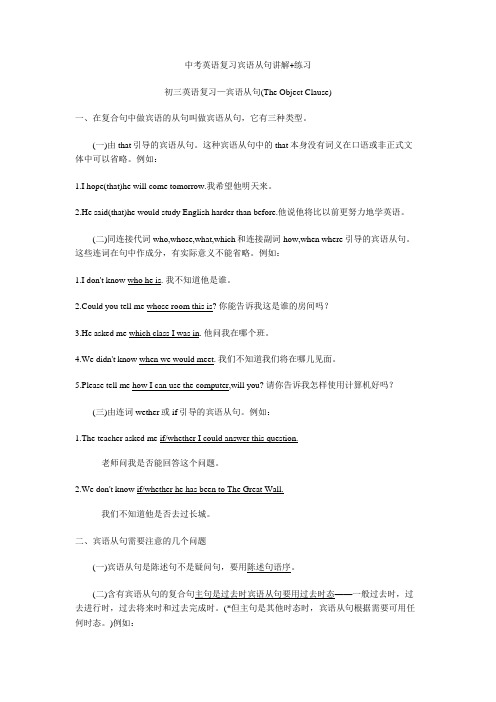
中考英语复习宾语从句讲解+练习初三英语复习—宾语从句(The Object Clause)一、在复合句中做宾语的从句叫做宾语从句,它有三种类型。
(一)由that引导的宾语从句。
这种宾语从句中的that本身没有词义在口语或非正式文体中可以省略。
例如:1.I hope(that)he will come tomorrow.我希望他明天来。
2.He said(that)he would study English harder than before.他说他将比以前更努力地学英语。
(二)同连接代词who,whose,what,which和连接副词how,when where引导的宾语从句。
这些连词在句中作成分,有实际意义不能省略。
例如:1.I don't know who he is. 我不知道他是谁。
2.Could you tell me whose room this is? 你能告诉我这是谁的房间吗?3.He asked me which class I was in. 他问我在哪个班。
4.We didn't know when we would meet. 我们不知道我们将在哪儿见面。
5.Please tell me how I can use the computer,will you? 请你告诉我怎样使用计算机好吗?(三)由连词wether或if引导的宾语从句。
例如:1.The teacher asked me if/whether I could answer this question.老师问我是否能回答这个问题。
2.We don't know if/whether he has been to The Great Wall.我们不知道他是否去过长城。
二、宾语从句需要注意的几个问题(一)宾语从句是陈述句不是疑问句,要用陈述句语序。
(二)含有宾语从句的复合句主句是过去时宾语从句要用过去时态——一般过去时,过去进行时,过去将来时和过去完成时。
宾语从句英文作文

宾语从句英文作文英文:As for the topic of object clauses, I believe they are an important part of English grammar. Object clauses are subordinate clauses that act as the object of the main clause. They usually begin with words such as that, if, whether, or whwords like who, what, where, when, why, and how. 。
For example, in the sentence "I know that he is coming," the object clause is "that he is coming," which acts as the object of the verb "know." Another example is "I wonder if she will come," where the object clause is "if she will come," acting as the object of the verb "wonder."Object clauses are used to express various functions such as opinions, feelings, thoughts, beliefs, doubts, and questions. They can also be used to report what someone else has said or thought. For instance, "She said that sheloves me," where the object clause is "that she loves me," reporting what she said.In addition, object clauses can be used with different verb tenses, such as present, past, or future, depending on the context. They can also be used with modal verbs like can, could, may, might, should, would, and must. For example, "I hope that he can come," where the object clause is "that he can come," expressing hope.In conclusion, object clauses are essential in English grammar as they allow us to express various functions and report what others have said or thought.中文:关于宾语从句这个话题,我认为它是英语语法中的重要部分。
整理好的宾语从句详细讲解(全)
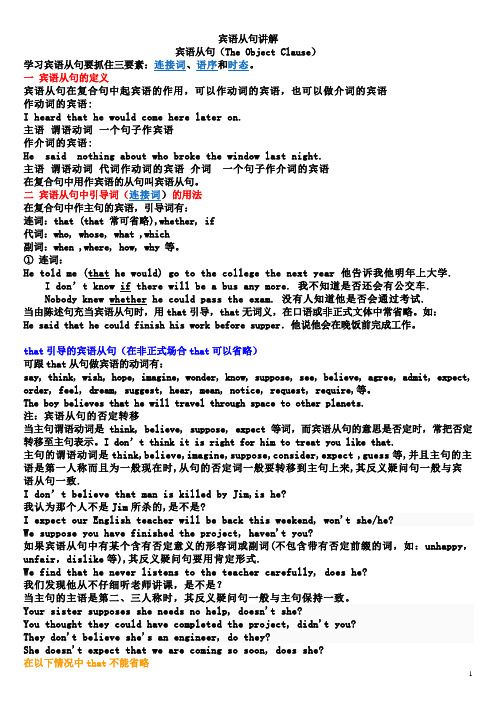
宾语从句讲解宾语从句(The Object Clause)学习宾语从句要抓住三要素:连接词、语序和时态。
一宾语从句的定义宾语从句在复合句中起宾语的作用,可以作动词的宾语,也可以做介词的宾语作动词的宾语:I heard that he would come here later on.主语谓语动词一个句子作宾语作介词的宾语:He said nothing about who broke the window last night.主语谓语动词代词作动词的宾语介词一个句子作介词的宾语在复合句中用作宾语的从句叫宾语从句。
二宾语从句中引导词(连接词)的用法在复合句中作主句的宾语,引导词有:连词:that (that 常可省略),whether, if代词:who, whose, what ,which副词:when ,where, how, why 等。
①连词:He told me (that he would) go to the college the next year 他告诉我他明年上大学.I don’t know if there will be a bus any more. 我不知道是否还会有公交车.Nobody knew whether he could pass the exam. 没有人知道他是否会通过考试.当由陈述句充当宾语从句时,用that引导,that无词义,在口语或非正式文体中常省略。
如:He said that he could finish his work before supper.他说他会在晚饭前完成工作。
that引导的宾语从句(在非正式场合that可以省略)可跟that从句做宾语的动词有:say, think, wish, hope, imagine, wonder, know, suppose, see, believe, agree, admit, expect, order, feel, dream, suggest, hear, mean, notice, request, require,等。
英语复合句的用法

The Complex Sentences in Junior English:
初中英语教材中涉及到的复合句主要有:The Object Clause ( 宾 语 从 句 ) 、 The Adverbial Clause ( 状 语 从 句 ) 和 The Attributive Clause (定语从句)。其它诸如主语从句、表语从句、 同位语从句等形式的复合句尽管在教材中也有出现,但在中考中 没有被列为重点考查范围。
例如: He says that__h_e__w_a_n__ts__t_o_s_p_e__a_k_t_o__y.ou.
(他想要和你通话) I’m sorry (that)_h_e__i_sn__’__t_h_e_r_e__ri_g_h_t_now.
他现在不在这里
that本身无意义,不充当任何成分,常被省略
(主语)
Did you hearw__h_a__t_h_e__s_a__id__? (宾语) 她说过什么吗
We didn’t knoww__h_e_n__s_h__e__w_o__u_l_d__c_o_m___e_b_ ack. (状语) 她将什么时候回来
连接代词/连接副词在宾语从句中充当一定的子成份,不 能省略
【速记口诀】 + 宾语从句须注意,几点事项应牢记。 + 一是关键引导词,不同句子词相异。 + 陈述句子用that;一般疑问是否替;(if,whether) + 特殊问句更好办,引导还用疑问词。 + 二是时态常变化,主句不同从句异。 + 主句若为现在时,从句时态应看意; + 主句若为过去时,从句时态向前移。 + 三是语序要记清,从句永保陈述序。
Note: 1.宾语从句的否定转移: 主句是I/We think/suppose/guess/believe等时,从句中的否定习惯上要
初中英语总复习----宾语从句
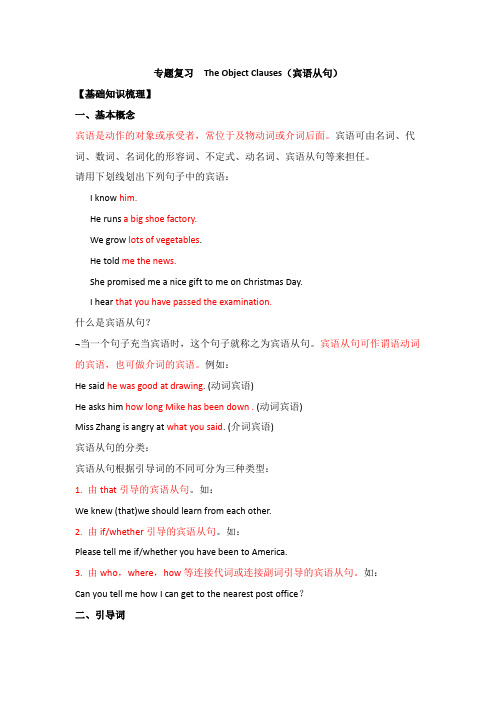
专题复习The Object Clauses(宾语从句)【基础知识梳理】一、基本概念宾语是动作的对象或承受者,常位于及物动词或介词后面。
宾语可由名词、代词、数词、名词化的形容词、不定式、动名词、宾语从句等来担任。
请用下划线划出下列句子中的宾语:I know him.He runs a big shoe factory.We grow lots of vegetables.He told me the news.She promised me a nice gift to me on Christmas Day.I hear that you have passed the examination.什么是宾语从句?¬当一个句子充当宾语时,这个句子就称之为宾语从句。
宾语从句可作谓语动词的宾语,也可做介词的宾语。
例如:He said he was good at drawing. (动词宾语)He asks him how long Mike has been down . (动词宾语)Miss Zhang is angry at what you said. (介词宾语)宾语从句的分类:宾语从句根据引导词的不同可分为三种类型:1. 由that引导的宾语从句。
如:We knew (that)we should learn from each other.2. 由if/whether引导的宾语从句。
如:Please tell me if/whether you have been to America.3.由who,where,how等连接代词或连接副词引导的宾语从句。
如:Can you tell me how I can get to the nearest post office?二、引导词如果从句是陈述句,引导词用that(that在口语或非正式文体中常省略);如果从句是一般疑问句,引导词用if/whether;如果从句是特殊疑问句,引导词用由疑问词转换而来的疑问代词/副词。
2019人教版九年级Unit2-3宾语从句
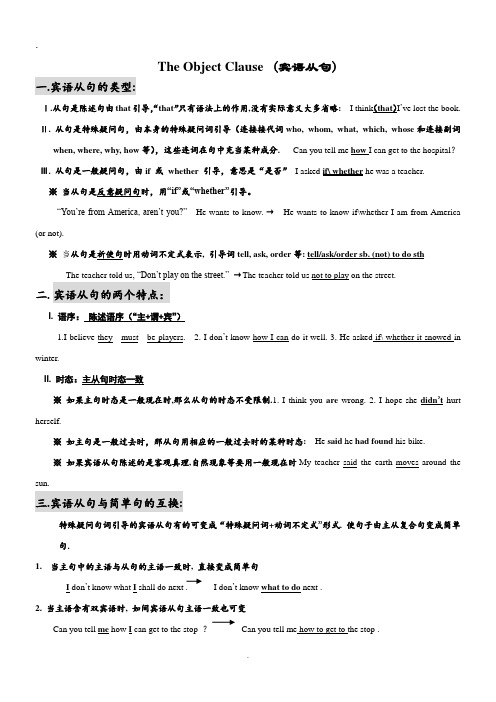
The Object Clause(宾语从句)一.宾语从句的类型:Ⅰ.从句是陈述句由that引导,“that”只有语法上的作用,没有实际意义大多省略: I think(that)I’ve lost the book. Ⅱ. 从句是特殊疑问句,由本身的特殊疑问词引导(连接接代词who, whom, what, which, whose和连接副词when, where, why, how等),这些连词在句中充当某种成分. Can you tell me how I can get to the hospital?Ⅲ. 从句是一般疑问句,由if 或whether 引导,意思是“是否”I asked if\ whether he was a teacher.※当从句是反意疑问句时,用“if”或“whether”引导。
“You’re from America, aren’t you?”He wants to know.→He wants to know if\whether I am from America (or not).※当从句是祈使句时用动词不定式表示, 引导词tell, ask, order等: tell/ask/order sb. (not) to do sth The teacher told us, “Don’t play on the street.”→The teacher told us not to play on the street.二.宾语从句的两个特点:I. 语序:陈述语序(“主+谓+宾”)1.I believe they must be players.2. I don’t know how I can do it well.3. He asked if\ whether it snowed in winter.II. 时态:主从句时态一致※如果主句时态是一般现在时,那么从句的时态不受限制.1. I think you are wrong. 2. I hope she didn’t hurt herself.※如主句是一般过去时,那从句用相应的一般过去时的某种时态: He said he had found his bike.※如果宾语从句陈述的是客观真理,自然现象等要用一般现在时My teacher said the earth moves around the sun.三.宾语从句与简单句的互换:特殊疑问句词引导的宾语从句有的可变成“特殊疑问词+动词不定式”形式. 使句子由主从复合句变成简单句.1.当主句中的主语与从句的主语一致时, 直接变成简单句I don’t know what I shall do next . I don’t know what to do next .2. 当主语含有双宾语时, 如间宾语从句主语一致也可变Can you tell me how I can get to the stop ?Can you tell me how to get to the stop .※值得注意的几点:1. 从句中如果出现or not ; 或动不式, 一般用whether※He didn’t tell me whether he would come or not. ※He don’t kno w whether to go ther e .2.当从句中出现否定句,一般只用if : I don’t care if she if she won’t come单选:1. ---Excuse me,do you know __________?—Sure.There is a bank there.A.when I can go to the bank B、where the bank isC、when can I go to the bankD、where is the bank2. –Can you tell me ___? –She is in the computer lab.A. where Linda wasB. where is LindaC. where was LindaD. where Linda is3. ---Sorry, what did you say just now? ---I asked _______.A. when did he leaveB. where you have beenC. whom will you go withD. how I could get to the station4. He didn’t know____A.what’s the matterB.what the matter isC.what was the matterD.what the matter was5. Can?you?tell?me?____?? A.?how?much?does?it?cost B.?how?much?it?isC.?how?much?it?costsD.?Both?B?and?C?6.They haven't decided ______ next yet A.how to do B.what to do C.what to do it D.where to go to7. —How clean the bedroom is! —Yes, I am sure that someone ____ it.A. cleans B. cleaned C. has cleaned D. had cleaned8. —I really hope to keep in touch with Lily. —Sorry. I don't know ______.A. what her name isB. what her job isC. what her number isD. when she left9.--- Would you please tell me _____? --- Of course. About twenty minutes’ walk.A. how far is it from the hotel B, how far it is from the hotel C. how long you have been in thehotel D. how long have you been in the hotel10 . Tom doesn't tell me when he _______. I will call you as soon as he _______.A.will come; comesB.will come; will comees; will comees; comes11. He hardly hurt himself in the accident, ______?A.doesn‘t heB.didn’t heC.did heD.does he12. — What would you like to drink, girls?— _____, please.A.Two cup of coffeeB.Two cups of coffeesC.Two cups of coffeeD.Two cup of coffees13. --Excuse me. Is there ___ park nearby?? --Yes. It’s over there next to___ post office.A. a, /???? ?B. a, the????C. /, the?D. the, a14. The music that his son is playing _______ beautiful. A. sounds B. look C. taste D. listens15.You must go __ that street to get to the park. A. cross B. across C. pass D. passed16. Tom and his friends used _________ at malls. but now they go to a music club.A. hang outB. hung outC. to hang outD. to hanging out17.Now parents _____ more and more money on their children's education.A. takeB. costC. spendD. pay18.They have organized games and the staff ___ clowns.A. dresses upB. dresses up asC.dress upD.dress up as各地中考题:宾语从句1. –Can you tell me ______? –She is in the computer lab.(09北京)A. where Linda wasB. where is LindaC. where was LindaD. where Linda is2. ---Excuse me, could you tell me __________? ---Sorry, sir. I wasn’t there at that time.(09福州)A. how did the accident happenB. how the accident happenedC. how does the accident happenD. how the accident happens3. I really want to know _______.(09兰州)A. what is wrong with my brotherB. how will he go to Beijing tomorrowC. if had he bought that carD. where did he go yesterday4. Excuse me, sir. Could you tell me ?(09广州)A. where is the bank nearestB. where is the nearest bankC. where the nearest bank isD. the nearest bank is where5. ---Could you tell me ____? He is wanted by the head teacher.---Sorry, I’ve no idea.But he ____ here just now.(09深圳)A. where Tim was, was B.where is Tim,was C. where Tim is,was D.where Tim is,is6. –Could you tell me __________? –Yes, it will start at ten. (09湛江)A. when will the meeting beginB.when the meeting will beginC.where the meeting beginsD. where does the meeting begin7. Everyone Can play an important role in the society.As members,we should try our best to do________.(09哈尔滨)A.what we should do B.what should we do C.how we should do8. I don’t know .(09恩施)A. how often he visits his grandparentsB. how soon will he come backC. how many students are there in his classD. how long is the bridge9. —Can you tell me ______? —By doing more speaking.(09黄冈)A. how I will improve my EnglishB. which way can I chooseC. how do I deal with my EnglishD. what’s wrong with my English10. —How clean the bedroom is! —Yes, I am sure that someone ______ it.(09武汉)A. cleansB. cleanedC. has cleanedD. had cleaned11. —I really hope to keep in touch with Lily. —Sorry. I don't know ______.(09武汉)A. what her name isB. what her job isC. what her number isD. when she left12. ---Excuse me,do you know __________?—Sure.There is a bank there.(09仙桃)A、when I can go to the bankB、where the bank isC、when can I go to the bankD、where is the bank13. — Tommy, do you know if Frank ____ to the zoo this Sunday if it ____? —Sorry, I have no idea. (09孝感)A. will go; is fineB. goes; is fineC. will go; is going to be fineD. goes; will be fine14. — Could you tell me _______? I must find him. —Sorry. I don’t know. But he was here just now. (09孝感)A. where Tom wasB. where has Tom goneC. where Tom isD. where can I find Tom15. --- Do you know ______ the new mobile phone last week? --- Maybe 900 yuan. I’m not quite sure.(09通化) A. how much she paid for B. how much will she pay forC. how much did she pay forD. how much she will pay for16. —The light in his room is still on. Do you know¬¬_________? —In order to prepare for the coming exam.(09常州)A. if he works hardB. why he stays up so lateC. why is he so busyD. when he will stop working17. —Can you tell me ____for the 60th China National Day? --A wonderful parade.A. what is going to be heldB. who is going to be invitedC. how much money will be raisedD. how long will it last18. —I’d like to know_______.—At 6.30.(09苏州)A.when does your mother usually cook breakfast B.how your mother usually cooks breakfast C.when your mother usually cooks breakfast D.how does your mother usually cook breakfast19. I don’t know________ the charity show tomorrow. Can you tell me?(09宿迁)A. when we startB. when did we startC. when we will startD. when will we start20. How lovely the dog is ! Can you tell me _________________?(09山西)A. where did you get itB. where will you get itC. where you got it。
宾语从句语法精讲
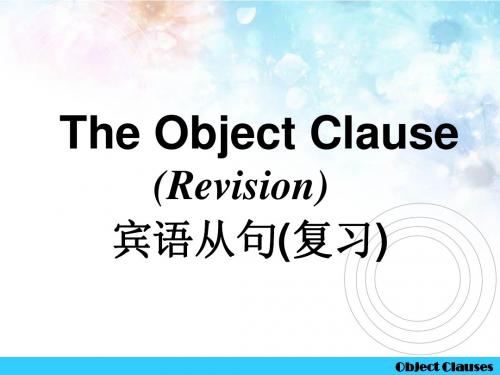
2)当疑问词是宾语从句的主语
Can you tell me who teaches you PE? 做主语 Can you tell me who is over there? I don’t know who has a dictionary?
Object Clauses
(三) 时态
1.当主句是一般现在时时,宾语从句可 根据实际情况而使用不同的时态。 I hear (that)
Object Clauses
只能用 whether不能用 if 的情况
1. 在介词后面: • I’m thinking of whether we should go fishing. • We are worried about whether it will rain tomorrow. 2. 在动词不定式前(whether to do sth): • They asked me whether to go skating. 3.当与or not连用,或提出两种选择时: • I don’t know whether he’s free or not. • Tell me whether you’d like to go shopping or tidy the room.
I don’t know if he will come tonight.
Let’s find out what’s on tonight .
Object Clauses
(一)引导词
由从属连词that引导的宾语从句 由从属连词 whether,if 引导的宾语从句 由连接代词 who, whom, whose, which,what 和连接副词 where, how, why, when引导的宾语从句
宾语从句详细讲解及习题

宾语从句(The Object Clause)定义:在主句谓语动词(及物动词)或介词后,充当宾语成分的句子。
★宾语从句要抓住三要素:连接词、语序和时态。
一. 宾语从句的引导词(连接词)。
根据引导宾语从句的不同连词,宾语从句可分为三类。
1.由that引导的宾语从句。
当宾语从句是陈述句时,连词由that引导,当that只有语法作用,没有实在的意义,在口语和非正式文体中可以省略。
可跟由that引导的宾语从句的动词有say, think, sure, wish, hope, know, see, believe, agree, expect, feel, hear, prefer, request, require, report,mean等。
例句:She knows (that) Tom is ill.他说他昨晚很早就睡了。
Which season is it? What’s this?What does the sign mean?▲that 不能省的两种情况:(1)当that作介词except ,in的宾语时。
例句:They believe in that she must win.除了他是美国人,我对他一无所知。
(2)用it作形式宾语时,it放在think, find, believe, feel, make等词后作为形式宾语,that引导宾语从句移到句子后部。
我听说她下个月会结婚。
2.由whether,if 引导的宾语从句当由一般疑问句充当宾语从句时,用if或whether引导,意为“是否”。
例句:I don't know if /whether he still lives here after so many years.我不知道这么多年后他是否还住在这儿。
1. I want to know __________________________________.(他是否跟我们一起去公园)2. Ask him _____________________. (他是否能来)3. I don’t know ___________________________.(是否要下雨)▲但在下列情况下只能用whether:(1)在具有选择意义,有or或or not时,尤其是直接与or not连用时,往往用whether.(2)在不定式前用whether:(3)在介词后面:(4)宾语从句提前时:3. 由连接代词who, whom, whose, what, which和连接副词when, where, why, how引导的宾语从句。
(完整版)宾语从句大全

宾语从句(The Object Clause)第一部分:宾语概要一不同词类作宾语二.非谓语类作宾语三.从句类作宾语四.两种特殊带宾语的结构五it用作形式宾语(基本用法)六.双宾语七.同源宾语(Cognate Object)第一部分:宾语概要宾语是动作、行为的对象,是动作的承受者。
宾语由名词、代词、不定式或相当于名词的词、短语来担任。
当然,也可以由一个句子来充当,称之为宾语从句;英语的及物动词后必须有宾语;除及物动词有宾语之外,英语介词后面也要有宾语;某些形容词如worth,careful等后也可有宾语;宾语有直接宾语和间接宾语之分。
即指人的间接宾语和指物的直接宾语,这两个宾语统称为"双宾语"。
一不同词类作宾语1. 名词作宾语She is playing the piano now.2. 代词作宾语We all like him.She doesn't know me.3. 数词作宾语Give me four.4. the+形容词/v-ed/v-ing结构作宾语。
1) The young should respect the old .2) They went to help the dying and the wounded.3) They are searching for the lost .二.非谓语类作宾语1.不定式作宾语We all like to go to school.注意: I don’t know what to do next.2.动名词作宾语The boss hates workers’ complaining.三.从句类作宾语I think he is right.Do you understand what I mean?I asked whether there are any chemist's shops in this street.Give him whatever he needs.We can rely on whomever we can trust.She will give whoever needs help a warm support.四.两种特殊带宾语的结构1.一些形容词可有宾语常用的情感形容词有:sure, afraid ,glad ,pleased ,happy ,worried ,sad ,sorryThe book is worth reading.2.介宾结构Are they listening to the professor?Are they satisfied with us?He passed the exam by cheating.五.it用作形式宾语(基本用法)I think it no need talking about it with them.He makes it a rule never to borrow money.Did you make it clear why she didn't come?I think it very strange that he goes out walking almost every night.She won’t like it if you arrive late.六.双宾语有些及物动词可接两个宾语(双宾语),即指人的间接宾语和指物的直接宾语。
高中英语语法 名词性从句详解

宾语从句的语序
和其他词性从句一样,宾语从句必须使用陈述语序, 不能用疑问语序。
How can I get to the station? Can you tell me →Can you tell me how I can get to the station 你能 告诉我怎样去车站吗? What does he like? I wonder. →I wonder what he likes. 我想知道他喜欢什么。
Choose the right answer
1. I have no idea ____. a. what does this word mean b. what this word means c. what the meaning of this word d. what kind of a meaning is this word
because, why引导的表语从句
That‟s because he didn‟t understand me. 那是因为他没有理解我。(That„s because 强调原因) That‟s why he got angry with me. 那正 是他对我生气的原因。(That‟s why 强 调结果)
Define the following sentences
Exercise:
1. __ we shall be late is certain. a. when b. how c. why d. that 2. __ he says doesn‟t concern you. a. what b. how c. that d. which 3. It is not yet known __ he did. a. how b. that c. what d. when
英语中的从句种类

英语中的从句种类在英语中,从句可以根据其引导词的不同进行分类。
主要的从句种类包括:名词性从句(Nominal Clauses):这些从句在句子中起到名词的作用,可以担任主语、宾语、表语或同位语。
它们包括:主语从句(Subject Clauses)宾语从句(Object Clauses)表语从句(Predicative Clauses)同位语从句(Appositive Clauses)定语性从句(Adjective Clauses):这些从句在句子中起到形容词的作用,用以修饰名词或代词。
它们包括:限定性定语从句(Restrictive Adjective Clauses)非限定性定语从句(Non-restrictive Adjective Clauses)状语性从句(Adverbial Clauses):这些从句在句子中起到副词的作用,用以修饰动词、形容词或整个句子。
它们包括:时间状语从句(Adverbial Clauses of Time)地点状语从句(Adverbial Clauses of Place)原因状语从句(Adverbial Clauses of Reason)条件状语从句(Adverbial Clauses of Condition)让步状语从句(Adverbial Clauses of Concession)目的状语从句(Adverbial Clauses of Purpose)结果状语从句(Adverbial Clauses of Result)特殊疑问词引导的从句:这些从句由特殊疑问词引导,用于对特定内容进行询问。
它们包括:由who, whom引导的表示人的名词性从句由what引导的表示事物或抽象概念的名词性从句由which引导的选择性名词性从句由whose引导的表示所属关系的名词性从句由where引导的表示地点的名词性从句由when引导的时间名词性从句由why引导的原因名词性从句由how引导的方式、方法名词性从句由whether引导的“是否”名词性从句。
什么是名词性从句
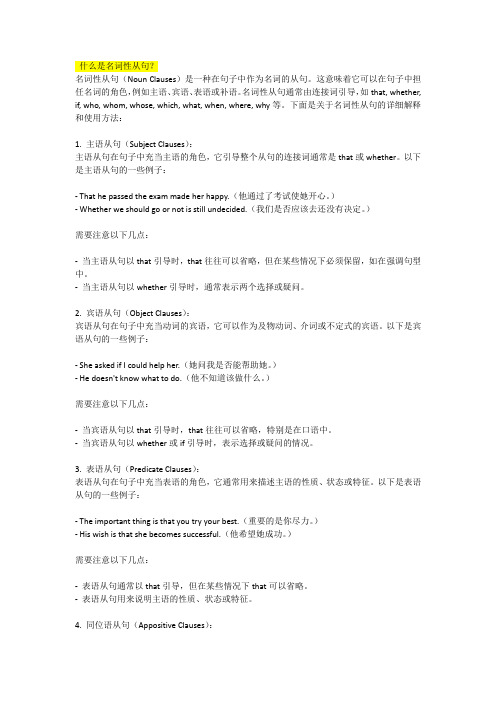
什么是名词性从句?名词性从句(Noun Clauses)是一种在句子中作为名词的从句。
这意味着它可以在句子中担任名词的角色,例如主语、宾语、表语或补语。
名词性从句通常由连接词引导,如that, whether, if, who, whom, whose, which, what, when, where, why等。
下面是关于名词性从句的详细解释和使用方法:1. 主语从句(Subject Clauses):主语从句在句子中充当主语的角色,它引导整个从句的连接词通常是that或whether。
以下是主语从句的一些例子:- That he passed the exam made her happy.(他通过了考试使她开心。
)- Whether we should go or not is still undecided.(我们是否应该去还没有决定。
)需要注意以下几点:-当主语从句以that引导时,that往往可以省略,但在某些情况下必须保留,如在强调句型中。
-当主语从句以whether引导时,通常表示两个选择或疑问。
2. 宾语从句(Object Clauses):宾语从句在句子中充当动词的宾语,它可以作为及物动词、介词或不定式的宾语。
以下是宾语从句的一些例子:- She asked if I could help her.(她问我是否能帮助她。
)- He doesn't know what to do.(他不知道该做什么。
)需要注意以下几点:-当宾语从句以that引导时,that往往可以省略,特别是在口语中。
-当宾语从句以whether或if引导时,表示选择或疑问的情况。
3. 表语从句(Predicate Clauses):表语从句在句子中充当表语的角色,它通常用来描述主语的性质、状态或特征。
以下是表语从句的一些例子:- The important thing is that you try your best.(重要的是你尽力。
初中语法宾语从句讲解与练习Object Clauses

宾语从句Object Clauses翻译:他告诉我们,他想呆在家里。
我听说他一个小时之后会回来。
2.由特殊疑问词who, whom, whose, which, what, where, how, why, when引导的宾语从句,这些词既有词义又在宾语从句中充当成分。
e.g.1)Do you know whose book it is ?2)Could you tell me why the train is late?3)He asked who could answer the question.(2011成都)——Can you tell me ______________ ? He’s a bank clerk.A.Who your father isB.What your father doesC.Where your father works(2012乌鲁木齐)I really don’t know______________?A.What should I doB. why he is so nervousC. How did he run awayD. where has he gone3.由从属连词whether, if 引导的宾语从句if/whether 引导宾语从句表示“是否”之义,说明对陈述的事物不明确或不清楚,在句中不充当句子成份. 常用在ask, wonder, can/could you tell me后(2012山东澭坊)We’ve given her some advice, but I don’t know _______ she’ll accept it.A.WhatB. whereC. whetherD. which 特殊情况:只能用whether不能用if的情况1.在介词后面:I’m thinking of whether we should go fishing.We didn’t think about whether it would rain the next day.2.在动词不定式前:They asked me whether to sit at the front.3.当与or not连用,或提出两种选择时:I don’t know whether he’s free or not.Mary asked whether I was doing my homework or not.Tell me whether you’d like to go shopping or tidy th e room.三. 宾语从句的语序无论主句是陈述句还是疑问句,宾语从句都是运用陈述句的语序,即是“主语在前,谓语在后”的顺序。
英语宾语从句作文

In English,object clauses are used to provide more information about the subject or the action in a sentence.They function as the object of the main clause and are typically introduced by a conjunction.Here are some examples of object clauses in various contexts:1.Requesting Information:When you want to ask someone for information,you can use an object clause.I asked her where she was going for her vacation.2.Expressing Opinions:You can use an object clause to share your thoughts or beliefs. He believes that learning a new language is beneficial for personal growth.3.Describing Actions:To describe what someone has done or will do,you can use an object clause.She told me that she had finished her homework.4.Making Suggestions:When offering advice or suggestions,an object clause can be used.I suggested that we should start early to avoid traffic.5.Expressing Preferences:To state what you prefer,an object clause can be helpful. They prefer that we meet at the park rather than at the cafe.6.Stating Facts:When you want to state a fact or a general truth,an object clause can be used.The teacher explained that the Earth revolves around the Sun.7.Expressing Surprise or Disbelief:To show surprise or disbelief about something,an object clause can be used.I was surprised to learn that he had never been to Paris.8.Making Promises or Commitments:When you want to promise something,an object clause can be used.I promised my parents that I would study hard.9.Expressing Wishes or Hopes:To convey what you wish for or hope for,an object clause can be used.She wishes that she could speak English fluently.10.Giving Instructions:When giving instructions or orders,an object clause can be used.The boss instructed his employees to finish the project by Friday.Remember,the object clause should follow the main clause and maintain the same tense as the main clause unless it refers to a past event or a general truth.Here is a short composition using object clauses:My Day with a FriendYesterday was a memorable day.I met my old friend,Sarah,after a long time.We decided to visit the museum,which I had always wanted to see.Sarah agreed that it would be a great idea.We spent hours exploring the exhibits and learning about art history.She told me that she had never been to such a fascinating place before.I was surprised to learn that she was so interested in ancient artifacts.We both enjoyed the experience and promised each other that we would make more time for such outings in the future.It was a day filled with laughter,learning,and the joy of rekindling an old friendship.。
宾语从句简单易懂版

练一练
用以下开头与下列句子连成宾语从句: 1.Do you know … 2.I want to know … 3.The teacher asks …
if/whether
1.Is he reading ? 2.Do you get up at six? 3.Does Tom work hard? 4.Did you watch TV ? 5.Will they read books ? 6.Can you sing ?
A. travelled C. travels
B. has travelled D. had travelled
7. Could you please tell me ____A____ he
will come here tomorrow? A. if B. weather C. what D. which
注意:只能用whether不 用if 的三种情况
• 一般情况下,if 和whether可以互换,但以下3种 情况只能用whether:
• ①与or not连用: He asked me whether or not I was coming.
• ②在介词之后: It depends on whether it is going to rain.
The Object Clause(宾语从句)
宾语
I don’t like his job. I don’t like what he does every day.
置于动词、介词等词性后面起宾语作用的从句叫宾 语从句。
有些形容词(afraid,sure,glad等)之后也可以带宾 语从句。
概念
3.He doesn’t know that when she can come back. _H_e__d_o_e_sn_’_t_k_n_o_w__w_h_e_n__s_h_e_c_a_n__c_o_m_e__b_a_ck_._______
初中英语从句

初中英语从句在初中英语中,从句是一个非常重要的语法结构。
从句可以作为主句的一部分,用来表达更加复杂的意思。
常见的从句有名词性从句、形容词性从句和副词性从句。
1. 名词性从句(Noun Clauses):名词性从句在句子中充当名词的角色,可以作为主语、宾语、表语或同位语。
- 主语从句(Subject Clause):例如:What he said is true.(他说的是真的。
)- 宾语从句(Object Clause):例如:She asked where I lived.(她问我住在哪里。
)- 表语从句(Predicate Nominative Clause):例如:His dream is that he can become a doctor.(他的梦想是成为一名医生。
)- 同位语从句(Appositive Clause):例如:The fact that he passed the exam surprised everyone.(他通过了考试的事实让每个人都感到惊讶。
)2. 形容词性从句(Adjective Clauses):形容词性从句用来修饰名词或代词,通常用来描述或限定名词的属性或特征。
- 关系代词引导的形容词性从句:例如:The book that you recommended is veryinteresting.(你推荐的那本书非常有趣。
)- 关系副词引导的形容词性从句:例如:He lives where the air is fresh.(他住在空气新鲜的地方。
)3. 副词性从句(Adverb Clauses):副词性从句用来修饰动词、形容词或副词,并且表达时间、地点、原因、条件、目的、结果等。
- 时间状语从句(Adverbial Clause of Time):例如:I will call you when I arrive.(我到达时会给你打电话。
)- 地点状语从句(Adverbial Clause of Place):例如:I will stay where I am.(我会待在原地。
- 1、下载文档前请自行甄别文档内容的完整性,平台不提供额外的编辑、内容补充、找答案等附加服务。
- 2、"仅部分预览"的文档,不可在线预览部分如存在完整性等问题,可反馈申请退款(可完整预览的文档不适用该条件!)。
- 3、如文档侵犯您的权益,请联系客服反馈,我们会尽快为您处理(人工客服工作时间:9:00-18:30)。
宾语从句The Object ClausesI know him . (简单句)主语谓语宾语I know who he is .(复合句)主语谓语连接词从句主语从句谓语主句宾语从句宾语从句的概念:宾语从句在复合句中作主句的宾语。
句子结构:主句 +连词(引导词)+ 宾语从句要点讲解一、宾语从句时态的呼应1. 如果主句是一般现在时、一般将来时或祈使句时,宾语从句可根据情况使用各种时态。
例如: I hear she is here today(she was here yesterday/ she will be here tomorrow.)2.如果主句是一般过去时,宾语从句应使用过去时态的某种形式。
例如: He said he was watching TV(he had swept the floor/ he would play football after school)。
3.如宾语从句所叙述的是客观事实、自然现象或科学真理等,从句不受主句时态限制,仍用一般现在时。
例如: Our teacher told us that light travels faster than sound.二、宾语从句引导词的使用1. 当宾语从句由陈述句变化而来时,用that来引导从句,that常无具体意义,一般可省略。
例如: Lin Tao thought(that)the TV play was very boring.2.当宾语从句是由一般疑问句变化而来时,要用if或whether来引导从句。
例如: David asked his mother if/ whether she liked the dinner last night.3.当宾语从句是由特殊疑问句变化而来时,原句中的疑问词充当连接代词(如who, whose, what, which)或连接副词(如when, where, why, how),引导宾语从句。
例如: Do you know what we can do on the island?I don’t know why Jane was late for school this morning.三、宾语从句语序的陈述化宾语从句一般要用陈述句语序。
例如: When did he leave? I want to know.→I want to know when he left.Does the shop close at six every day? Do you know?→Do you know if/ whether the shop closes at six every day?四、宾语从句否定转移当主句的谓语动词为think, believe, suppose等动词,且主语为第一人称时,从句的否定要转移到主句上。
例如: I don’t believe he is here on time, is he?I don’t think Tom is the best student in his class, is he?五、宾语从句的简化宾语从句在一定条件下可以简化为“特殊疑问词+动词不定式”、“it+形容词+不定式短语”、“复合宾语”、“动词不定式”等。
例如: I don't know what to do.I think it important to learn English well.考点解析一、考查宾语从句的语序问题。
语序应用陈述语序,且引导词一定要在从句的最前面。
【考例1】—Alice, I hear there is a new library in your city. Could you tell me ? —Sure.A. how far is itB. how I can get thereC. where is itD. which bus should I take【简析】B。
宾语从句要求用陈述语序, 而A、C、D都是疑问语序, 故选B。
【考例2】—Excuse me. Could you tell me ?—Yes. There is a video shop on River Road.A. where can I buy some CDsB. where I can buy some CDsC. when can I buy some CDsD. when I can buy some CDs【简析】B。
宾语从句要用陈述语序, 可排除A、C;根据答语可知, 询问的是“在哪里可以买到CD”, 故选B。
【点拨】在含有宾语从句的复合句中, 不管主句是陈述句或是疑问句, 从句一律用陈述句语序。
二、考查宾语从句的连接词问题。
(1)引导宾语从句的有从属连词that, whether 和if;连接代词who, whom, whose, what, which, whatever,whichever, whoever等;连接副词when, where, how, why等。
选用何种连接词主要根据①所选词在从句中所作成分;②从句意判断句中缺少的意项。
【考例】①She is very dear to us. We have been prepared to do_____it takes to save her life.A. whicheverB. howeverC. whateverD. whoever②As a new diplomat, he often thinks of_____he can react more appropriately on such occasions.A. whatB. whichC. thatD. how③ I want to be liked and loved for I am inside.A. whoB. whereC. whatD. how④ We haven’t discussed yet ______ we are going to place our new furniture.A. thatB. whichC. whatD. where【简析】①C。
whichever―无论哪一个‖;however―无论如何‖;who ever―无论谁‖;whatever―无论什么‖。
由分析可知,该引导词引导的是宾语从句,且从句中take缺少宾语,由句意―她对我们来说是非常宝贵,我们已经准备好做一切来拯救她的生命。
‖可知,应用whatever。
②D。
句意为―作为一种新的外交官,他经常考虑他怎么能在那样的场合反应更恰当。
‖很显然,该宾语从句缺少一个表示―方式‖的词,故用how。
③C。
句意为―我想别人喜欢我是因为我的内在。
‖也就是我inside的品质。
只有what 可以指代是什么。
很多同学误选A,错误的用中文语言习惯去做英文题。
④D。
由句意为―我们还没有讨论把我们的新家具放在哪里。
‖可知,动词discuss 后的宾语从句缺少地点状语,故用where。
【点拨】1. 引导陈述句用that。
that不充当句子成分, 也没有实际意义, 常可省略。
2. 引导一般疑问句用if或whether, 表示“是否”。
注意:在介词之后, 动词不定式之前或与or not连用时, 用whether而不用if。
3. 引导特殊疑问句, 常用连接代词what, who, whom, which, whose等, 连接副词when, where, how,why等或副词短语how often, how long, how soon, how far, how much等。
(2)宾语从句中注意下列几组相似意思的区别。
考查引导词whether与if的区别。
两者都表示―是否‖,都可引导宾语从句;但如果宾语从句是否定句一般用if;下列情况用whether①作介词宾语;②后紧跟or not; ③作discuss等词的宾语。
【考例】①At first he hated the new job but decided to give himself a few months to see _____ it got any better.A. whenB. h owC. whyD. if②We haven't settled the question of ______ it is necessary for him to study abroad.A. ifB. whereC. whetherD. that【简析】①D。
句意为―最初他不喜欢这件新工作,但是他决定给自己几个月的时间来看一下这件工作是否会变得更好。
‖所以用if表―是否‖,引导宾语从句。
②C。
句意为―我们还没有解决他是否有必要出国留学这个问题。
‖此处是宾语从句,表―是否‖,含有不确定,且作介词的宾语,故用whether。
(3)考查引导词wh-与wh-ever的区别。
―wh-ever‖引导宾语从句时,其含有―无论……‖之意,其引导宾语从句无疑问意义,相当于名词或代词加一个定语从句,而wh-多有疑问之意。
【考例】① Could I speak to_____ is in charge of International Sales please?A. whoB. whatC. whoeverD. whatever②– Could you do me a favour? – It depends on ______ it is.A. whichB. whicheverC. whatD. whatever【简析】①C。
whoever引导的宾语从句作了 to 的宾语,同时whoever作is in charge of International Sales please的主语。
whoever意为―任何人或无论谁‖,相当于any person who或the person who。
②C。
what引导宾语从句,并在从句中充当表语,意为―什么‖,含有具体之事的意思。
句意为―那取决于是什么‖。
(4)考查引导词no matter+疑问词与疑问词+ever的区别。
―no matter+疑问词‖只能引导状语从句;而―疑问词+ever‖既可引导状语从句,也可引导宾语从句。
【考例】①The book can be of help to _____ wants to do the job.A. whoB. whomeverC. no matter whoD. whoever②Sarah hopes to become a friend of ______shares her interests.A. anyoneB. whomeverC. whoeverD. no matter who【简析】①D。
